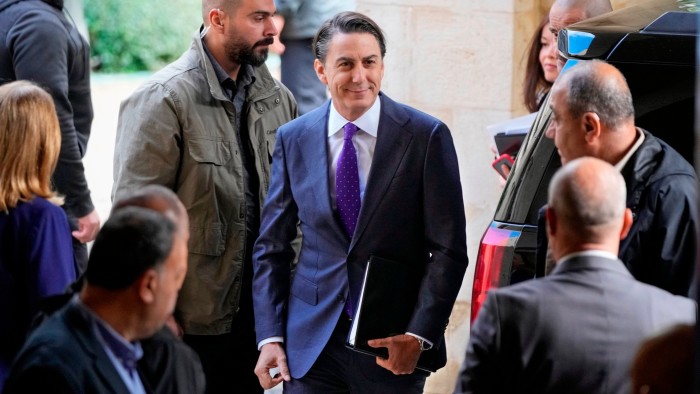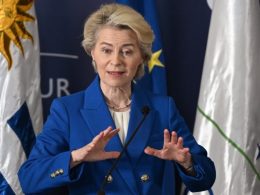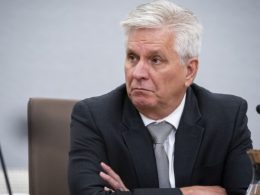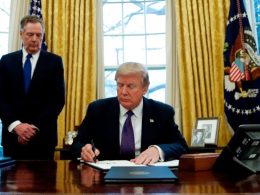Amos Hochstein had been battling for months in 2022 to mediate a deal between Israel and Lebanon when the leader of the militant group Hizbollah unleashed a tirade against the US envoy, accusing him of being “compromised”, “dishonest” and biased in Israel’s favour.
“I say to the Lebanese state, you want to complete the negotiations, that is your business, but [not] . . . with Hochstein nor with Frankenstein nor with Einstein coming to Lebanon,” said Hassan Nasrallah, whose acquiescence would be critical to any agreement, in a speech via video link.
Yet Hochstein, who was born in Israel and, according to Israeli media, served in the country’s military before entering US diplomacy, had the last word. In October 2022, he brokered a landmark deal to resolve a decades-long maritime dispute between Israel and Lebanon — two countries formally at war since the former’s founding.
Last week, Hochstein pulled off his second Middle Eastern diplomatic success in two years, brokering a ceasefire between Israel and Hizbollah after their simmering conflict morphed into full-blown war.
At times it had appeared an impossible mission. Hizbollah vowed to continue firing on Israel as long as Israeli forces kept up their offensive against Hamas in Gaza, while Israeli Prime Minister Benjamin Netanyahu expanded Israel’s assault against the group, assassinating Nasrallah and invading southern Lebanon.
The truce is fragile, with both sides accusing each other of breaches and Israel continuing to strike Lebanon. But it allowed Joe Biden to walk into the White House’s Rose Garden in the twilight of his presidency and, in Hochstein’s words, tell the public he finally had “good news” from the Middle East.
In many ways, Hochstein, ostensibly Biden’s energy adviser, is an unlikely Middle East peacemaker. His links to Israel have triggered suspicion in Lebanon — his parents have a home in the country as well as in the US. At the same time, some within Israel’s security establishment view him warily as a “former” Israeli not fully beholden to their nation.
He is, however, considered one of Biden’s most trusted lieutenants, a fixer who gets things done, and one of a small group of senior officials with outsized roles in the president’s Middle East policies.
An official in the Middle East who had worked with Hochstein described him as exuding “positive American arrogance”. “Even if he’s sometimes difficult to work with, he’s effective and he gets results,” the official said.
“His approach is almost to say, ‘I am going to manifest this, I will find a way to make this happen’,” said Helima Croft at RBC Capital Markets, who has known Hochstein for more than a decade.
“He is driven by a deep underlying personal loyalty to President Biden, and Biden put his trust in him — his purview became very broad because he was effectively working with a mandate direct from the president.”
Hochstein started his career in Washington as an adviser to a congressional foreign affairs committee and to Democratic senators, displaying a penchant for travel to volatile parts of the world.
In 1997, he spent a week in North Korea visiting hospitals, kindergartens and collective farms.
Two years later, he was among a group of five US congressional staff members who reportedly ignored state department objections to go to Saddam Hussein’s Iraq — the first such trip since the 1991 Gulf war — with a proposal to ease sanctions in return for the late dictator halting Baghdad’s weapons programme.
Discussions also took place on the idea of resettling Palestinians to Iraq, as part of an Israeli-Palestinian peace process.
In the 2000s he worked for Cassidy & Associates, a Washington-based lobbying firm, with oil-rich Equatorial Guinea and its autocratic President Teodoro Obiang Nguema as his client, a role he has defended by saying that Obiang “convinced me of his deep care for his people”.
Hochstein’s star kept rising. He joined the state department in 2011 as deputy assistant secretary for energy diplomacy. After Donald Trump’s first election victory he worked at Tellurian, a Houston-based gas company founded by Lebanese-American Charif Souki, and joined the supervisory board of Naftogaz, the Ukrainian state-controlled energy company.

After Biden was elected, Hochstein returned to government in 2021 as senior adviser for energy security. As one of the few top officials who understood — and was sympathetic to — the oil and gas industry, he was central to Washington’s efforts to manage the turmoil in energy markets triggered by Russia’s full-scale invasion of Ukraine the following year.
“He’s always just gotten stuff done within the bureaucracy in a way that Biden likes, and Biden and Sullivan trust him,” said Michael Wahid Hanna of Crisis Group. “He’s a very loyal Biden servant and offers something different than a standard bureaucrat.”
Hochstein was critical in negotiating LNG supplies for Europe, and sounded the alarm on the issue as early as 2021, said Croft: “He saw very clearly Russia’s direction of travel and made clear steps needed to be taken quickly to ensure Europe could access as much alternative gas as possible.”
He was also handed the daunting task of trying to convince Saudi Arabia — which Biden had pledged to treat as a pariah — to increase oil production to ease soaring energy prices.
Riyadh resisted, maintaining it would act on market fundamentals. But Hochstein helped convince Biden to put aside his opprobrium for Saudi Arabia’s human rights record and take the pragmatic view that Washington needed the kingdom’s co-operation.
That culminated in Biden’s trip to the kingdom in 2022 and an awkward fist bump between the president and Crown Prince Mohammed bin Salman. Hochstein became integral to Biden’s efforts to seal a grand bargain with Saudi Arabia in which Riyadh would normalise relations with Israel in return for a US defence treaty and support for its civil nuclear programme.

Just as the US hoped it was closing in on a historic deal, Hamas’s October 7 2023 attack on Israel sparked the war in Gaza and a wave of regional hostilities, including the conflict with Hizbollah.
Biden dispatched Hochstein to try to contain a conflict that Washington feared could be the fuse for an all-out Middle East war.
Tall, full of swagger and with a sharp sense of humour, Hochstein always insisted he could decouple the conflict between Israel and Hizbollah from the war in Gaza — a calculation that ultimately proved correct.
Some of his Lebanese interlocutors speak warmly about him, appreciating the manner in which he hustles for a deal.
But one Arab official described him as “conceited”, “condescending” and “obsessed with controlling and portraying himself as the region’s saviour”.
During the months of negotiations, the US’s allies often had little sight of the details. Arab and western officials said Hochstein kept his cards close to his chest. “We would only hear from random politicians what our involvement would be in some aspect of the deal. Never from him directly,” said a western diplomat.
There have even been complaints within the state department that no one knew what Hochstein was doing. Senior administration officials have previously said he could freelance because he had a direct line to Biden.
The envoy often professes an affinity for Lebanon. He met the country’s late former prime minister Rafiq Hariri in the 1990s, Hochstein told a Saudi television channel three years ago.
“It’s quite remarkable to come every year, over 26 years almost . . . I feel like I’ve grown up with post [civil] war Lebanon, for good and bad,” Hochstein said.
Yet many in Lebanon, particularly Hizbollah supporters, viewed the US and Hochstein as being soft on Netanyahu and tacitly greenlighting his ramped-up offensive. In Israel there has been criticism that given the country’s battlefield gains, Netanyahu’s far-right government could have pushed for a tougher deal.
Hochstein argues that complaints from both sides mean he is doing his job correctly. He will now co-chair the US-led committee that is supposed to monitor and oversee the implementation of the ceasefire deal. But given the hostility and distrust between Israel and Hizbollah, and the belligerence of Netanyahu’s far-right government, the critical question will be whether the deals he brokered can survive.
Additional reporting by Felicia Schwartz in Washington, Derek Brower in New York and David Sheppard in London
Source link









